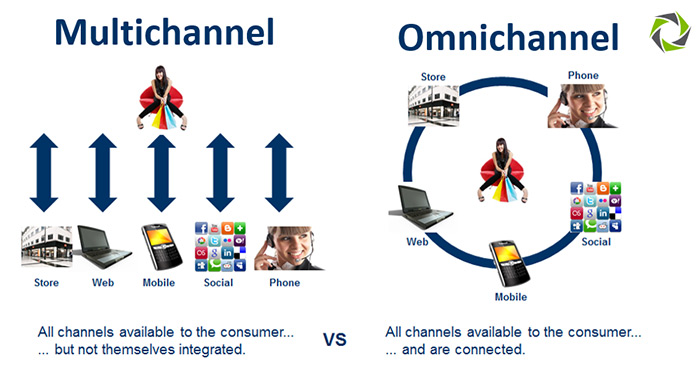You could almost mistake it for a distinction without a difference. In fact, some of the most seasoned marketing professionals have been known to do just that. However, the devil is in the details, and the fact is that omni-channel marketing and multi-channel marketing – two hot topics in the field today – really are distinct (and different) approaches to engaging the customer on his or her journey. And both methods have their adherents, and their advantages.
The question, then, becomes how do you weigh the pluses and minuses of each and arrive at an effective plan for optimizing the growing array of marketing channels most organizations utilize today?

First, let’s define terms
Since the terms still get bandied around as if they were interchangeable, it can’t hurt to spell out exactly how they’re being used here. Multi-channel marketing is exactly what it sounds like – offering customers multiple ways to engage with your brand, commonly through channels such as mobile apps, website, social media, email or phone. Any company using two or more such channels is engaged in multi-channel marketing. That’s straightforward enough. The confusion arises from the fact that omni-channel marketing also relies on using multiple channels, making it easy to mistake the two approaches for one and the same.
Here’s where they’re different, though. Multi-channel might deliver very different customer experiences from one channel to another. That can be a good thing, if the marketing goal is to target a specific audience with a tailored message and experience, or to optimize performance at the selected channel. Or it can be an undesirable thing, if the differences in customer experience from channel to channel prove to be jarring and disruptive for customers who engage with the brand across more than one channel.
Omni-channel marketing attacks that problem by delivering a consistent, seamless customer experience from every channel. That consistency results in a more satisfactory customer journey and, research shows, a significantly greater rate of customer retention. A recent blog post by Datorama, a leader in helping companies connect all of their data sources together, looking at the omni-channel vs. multi-channel marketing question, cited a study showing that customer retention rates were nearly twice as high for companies offering an omni-channel customer experience compared to those that don’t.
Two more factors to consider
First, it shouldn’t be lost in any assessment of omni-channel vs. multi-channel marketing that both of the approaches are made possible by, and are supported by, the integrated, holistic software solutions that have transformed digital marketing.
Since both benefit from the new technology, that doesn’t tip the scales one way or the other. Yet it still is important to keep in mind the ways marketers are now able to aggregate, optimize, and visualize the various channels employed by way of a single, integrated dashboard that offers critical analytics and the ability to visualize all elements of a campaign in real time.
A second point raised by the aforementioned post was a particularly relevant insight for marketers trying to decide when an omni-channel approach is best, and when a multi-channel one is. At heart, the difference between the two is the difference between a strategy and a tactic, the writer noted.
Omni-channel marketing, that is, can be thought of as strategic, because it embraces and reflects the overarching “why” of a marketing campaign. It’s an integrated, comprehensive response to the rising expectations of today’s customers and the constantly evolving complexities of digital marketing.
Multi-channel marketing, on the other hand, consists of a series of discrete tactics, specific actions that no doubt contribute to a larger strategy but in and of themselves don’t add up to a whole. Think of the ways in which omni-channel marketing serves to unify the message and the customer experience, and of the ways in which multi-channel marketing is better geared to treat each touchpoint as a unique experience.
So which approach is best for you?
It’s clear that both omni-channel and multi-channel marketing have their places in the digital marketer’s toolkit, and both make full use of the cutting-edge technologies that offer marketers unparalleled ways to shape and affect the customer journey.
The strategy vs. tactic distinction is a compelling one. Undoubtedly, multi-channel marketing, supported by the right tools, can be a precise and effective way to fine-tune the way a customer experiences a given channel. Just as surely, though, omni-channel marketing is the better match for delivering the consistent, unified experience marketers are discovering contemporary customers actually want.
When it comes right down to it, today’s customers are making the choice themselves. Almost always, they are engaging with your brand via any number of channels and looking for a seamless experience along the way. In that way, they have already cast their own vote for omni-channel marketing.







